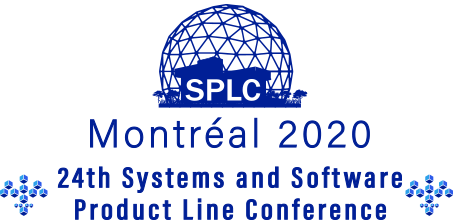Software and systems product line engineering is increasingly being adopted across the industry. In the last decades, organizations have been taking advantage of systems and software product line practices to achieve significant business advantages in terms of reducing time-to-market and cost, whereas improving the quality and dependability. Applying product line engineering encounters a wide range of challenges that hinders their successes and adoption in the industry. The emergence of Industry 4.0 and new technologies such as cyber-security, block-chain, digital twins, artificial intelligence, and machine learning are posing new challenges to apply product line engineering in the industry. We are seeking contributions from the industry that share their challenges, successes, and specifics of existing practices in all stages of technology readiness levels of industrial systems.
IMPORTANT DATES (AOE TIME)
We extended the deadlines due to COVID-19, the new deadlines are firm:
- Abstract submission:
April 10, 2020Thursday May 7th, 2020 - Paper submission:
April 17, 2020Thursday May 14th, 2020 - Notification:
May 29, 2020Friday July 10th, 2020 - Camera-ready paper:
June 12, 2020Friday Sept 25th, 2020 - Conference: October 19-23, 2020.
TOPICS
We solicit papers on the following topics (but not limited to):
- Introducing PLE to an organization, migration to a product line approach
- Digital twins, artificial intelligence, and machine learning impact on product lines
- Cyber security, blockchain, and other technologies impact on product lines
Application of other novel technologies, e.g., DevOps, quantum computing, HPC, Exascale computing, Cloud/Edge/IoT computing, and other emergent technologies - Business ecosystems around product line engineering
- Processes and methods, e.g., combining PLE with DevOps and agile practices
- Scoping of product/solution portfolios and assets
- Architecture, design, and implementation of product lines
- Variability management across all stages of the life-cycle
- Quality and non-functional properties in PLE and software ecosystems
- PLE tools and methods for guidance and governance (including continuous integration)
- Product line testing and validation
- Version and configuration management
- Disruptive innovations and their effects on software product lines
- SUBMISSIONS
- Full papers – Reporting experience from industrial applications and projects. The papers in this category must provide sufficient context of the problems identified or addressed, describe clear requirements and/or experience in solving them, provide an assessment of benefits and drawbacks or other lessons learned, and explain why the contribution is innovative or valuable for others.
- Short papers – Describing, from an industrial perspective, early returns on new product line and software ecosystem applications and projects, or other shorter industry topics of interest.
- Industrial presentations – A short abstract from the industry for a presentation on any of the topics mentioned above from the industrial practice.
The page limit is 10 pages for full papers and 5 pages for short papers, not including references (2 extra pages maximum). The abstract for industrial presentation shall be on 1 page. Submissions must follow the ACM Master Article Template and will be reviewed by at least three members of the program committee for the Industrial Systems and Software Product Lines Track.
\documentclass[sigconf]{acmart}
\acmConference[SPLC'20]{24th ACM International Systems and Software Product Line Conference}{19--23 October, 2020}{Montreal, Canada}
The SPLC proceedings will be published in the ACM Digital Library. SPLC is ranked as a top conference.
At least one author of each accepted submission must register and attend SPLC 2020 for the submission to be published.
Submissions should be sent using Easychair: submit here.
CHAIRS
PROGRAM COMMITTEE
- Paul Grünbacher, Johannes Kepler University Linz, Austria
- Martin Becker, Fraunhofer, Germany
- Lidia Fuentes, University of Malaga, Spain
- Jan Bosch, Chalmers University of Technology, Sweden
- David Negro, LMCO, USA
- Daniel Schall, Siemens Corporate Technology, Germany
- Christoph Elsner, Siemens AG, Germany
- Hironori Washizaki, Waseda University, Japan
- Juha-Pekka Tolvanen, MetaCase, Finland
- Alessandra Bagnato, Softeam, France
- Bran Selic, Malina Software Corp., Canada
- Goetz Botterweck, Lero and University of Limerick, Ireland
- Maxime Cordy, University of Luxembourg, Luxembourg
- Jean-Marc Jézéquel, University of Rennes, France
- Sebastien Gerard, CEA LIST, France
- Danilo Beuche, pure-systems GmbH, Germany


